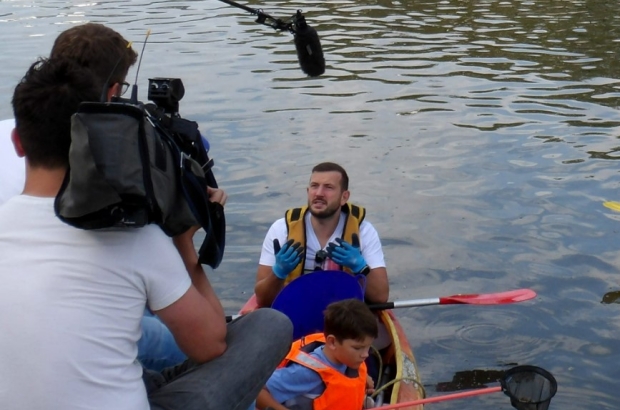- Daily & Weekly newsletters
- Buy & download The Bulletin
- Comment on our articles
World Cleanup Day: European commissioner joins Brussels canal clean-up
Brussels residents took part in World Cleanup Day over the weekend, picking up litter and rubbish in neighbourhoods and also tackling the Brussels canal.
Virginijus Sinkevičius, European Commissioner for the Environment, also rolled up his sleeves and joined in the efforts to clear rubbish from the waterway in collaboration with the Canal It Up organisation.
“We live in Brussels and we love the city, so we wanted to do our bit to tackle the problem of the canal,” Sinkevičius said.
On kayaks, volunteers split into several groups to pick up as much rubbish as possible.
“We saw a bit of everything – bottles and plastic bags,” one volunteer said. “The organic stuff we left behind, we just picked up the plastic and there's a lot of it. Unfortunately, I was quite surprised to see so much plastic in the canals.”
The Port of Brussels also cleans the canal using two maintenance boats and, every year, 200m³ of rubbish are removed.
Canal It Up has been dealing with problems such as litter in the Charleroi-Brussels canal and the Senne river in Brussels since 2019. Together with Sinkevičius, it hoped to use World Cleanup Day to raise awareness about pollution in the canal.
“The amount of rubbish we take out of the canal is enormous, and even if fishing for rubbish with kayaks isn't the most efficient way, when our participants set off for 45 minutes, they come back with a whole bin – between three and six kilos of rubbish,” the organisation said.
According to Canal It Up, most of the waste ends up in the Brussels canal due to wind.
“The streets of Europe's capital serve as a direct indicator of the cleanliness of the surrounding waterways,” the organisation said.
“The lack of naturalness of waterways also affects the cleanliness of waterways, reducing the ability of rivers and canals to counter man-made pollution.”
Canal It Up is calling for a deposit scheme to be introduced for plastic cans and bottles as part of the solution, adding that supermarkets and manufacturers should also use plastic-free and reusable packaging in the future and publish the amount of plastic produced every year.
Watercourses should regain their natural character, the organisation said, and have a more prominent place in society.



















